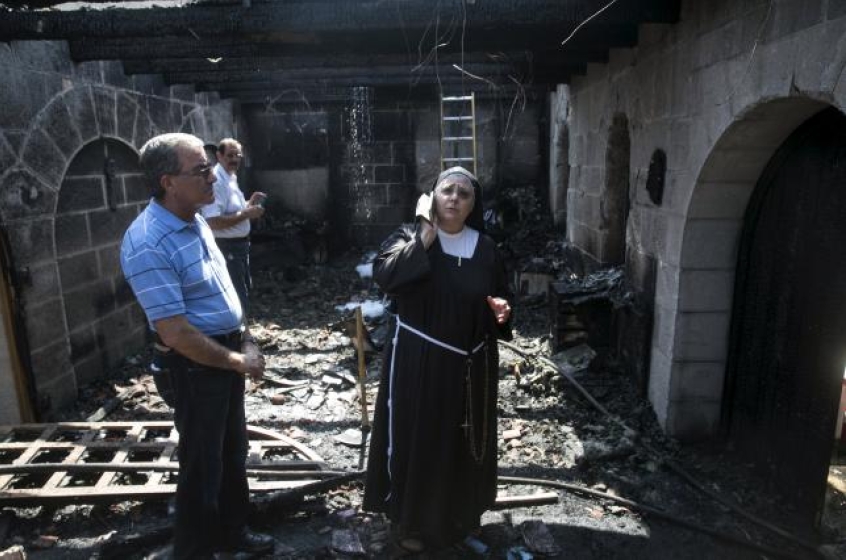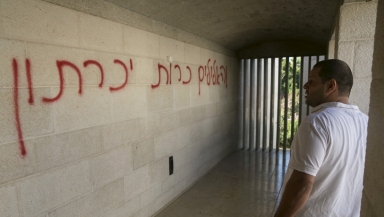
A Catholic bishop in Jerusalem has said the arson attack on an historic church near the Sea of Galilee last week is symptomatic of the growing threat of anti-Christian violence from extremist Jews.
Thursday's attack on the Church of the Multiplication of the Loaves and Fishes, in which two people were treated for smoke inhalation, is the second time the church has been targeted in the last 18 months. Last April an altar and a cross were also desecrated.
Bishop William Shomali, Auxiliary Bishop of the Patriarchate of Jerusalem, told Aid to the Church in Need: "There is a real escalation in anti-Christian violence: from a small fire which leaves little damage, to a bigger fire, and finally to an arson attack which is intended to produce major damage and even killing," he said, adding: "We are allowed to ask: What will come next?"
The bishop acknowledged that the violence was likely perpetrated by "a very small and aggressive group".
"I cannot put all Israelis in the same basket, since there are the liberal and intolerant Jews, those who are less [tolerant] and finally those who hate the non-Jews," he said.
"My fear is that these radicals are increasing in number and in the degree of intolerance."
Yesterday thousands of Christians protested outside the Church of the Multiplication, Haaretz reports. The event was supposed to be a prayer rally, and a mass did take place inside the church, but outside youths carrying crosses and Vatican flags blocked the road leading to the church and called for those responsible to be brought to justice.

Israeli Prime Minister Benjamin Netanyahu has condemned the incident, saying that the attack on the church is "an attack on us all" and that the government would "fulfill the law against those responsible for this criminal action".
President Reuven Rivlin also said that "such terrible desecration of an ancient and holy place of prayer, is an attack on the very fabric of life in our country. Israel, as a state and a society, is obligated to protect and preserve the holy sites, for all faiths."
Even so, there are concerns that the government has not done enough in the past to ensure that Jewish extremists are brought to justice.
Israeli campaign group Rabbis for Human Rights reports that there have been 43 criminal acts against holy sites, including mosques, churches and monasteries, in the past six years.
Other examples include anti-Christian graffiti at a Catholic monastery near Beit Shemesh in January 2014, where vandals also punctured car tyres. In May last year extremists wrote "Death to Arabs and Christians and those who hate Israel" on the Notre Dame centre in Jerusalem.
Tag Meir, an anti-racism group told the Independent that there have been no indictments for the attacks on holy sites in the last three years.
"Punishing these crimes is not a priority for the authorities," said Yossi Saidov of Tag Meir. "The message that comes down from the Prime Minister to the individual policeman is that it's all right that this happens, it's not so terrible."
"If 43 synagogues were attacked in Poland and the authorities didn't stop it, we would scream that it was anti-Semitism and rightly so," he added.
Father Emeritus Michel Sabbah also said: "When I keep seeing this happening, I see a government in Israel, and I see leaders who are not doing their job.
"We as Christians believe in the message of Christ, the message of love, no matter what happens, here we stay; we aren't demanding the protection of anybody, here or abroad... The state must know its duties, and must perform them."













